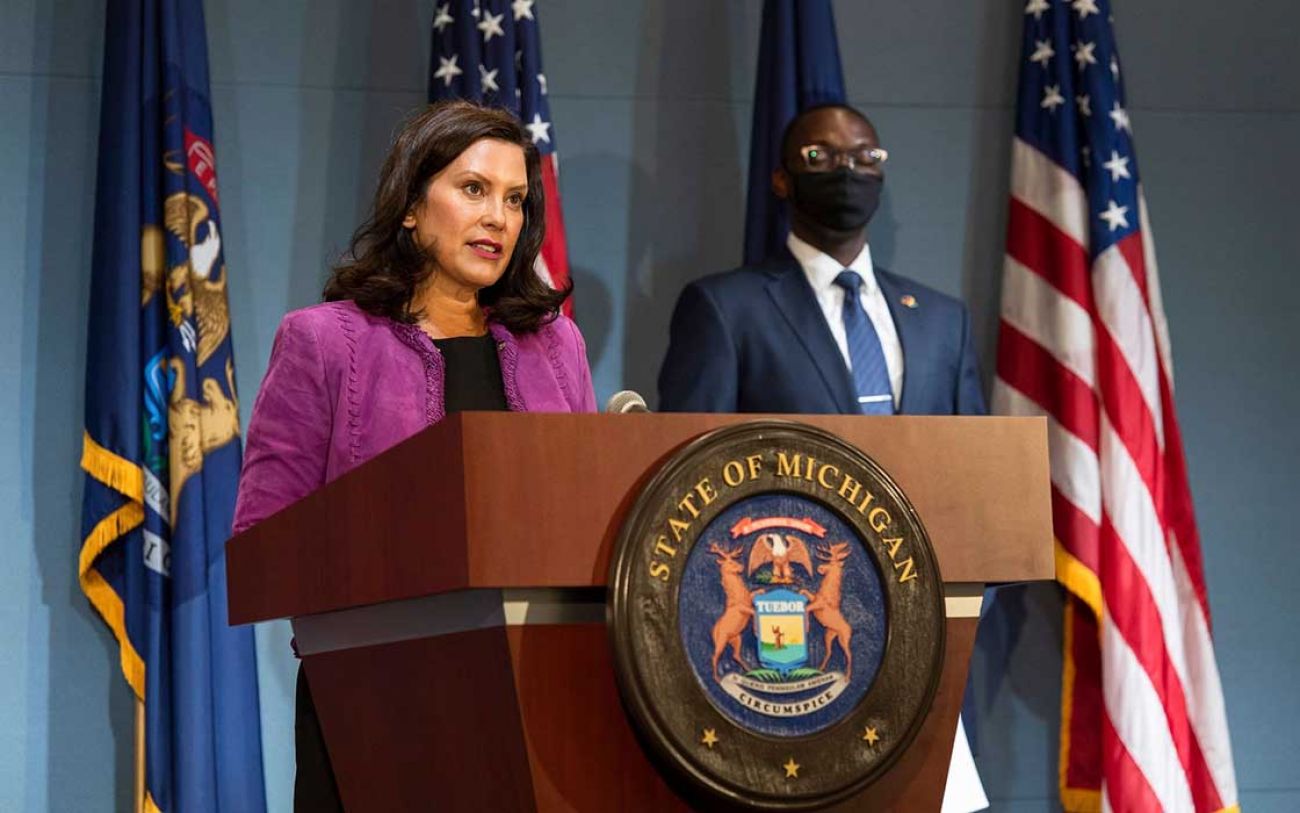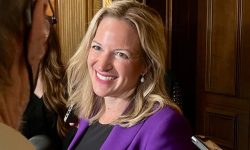Gov. Whitmer unveils $5.6B COVID plan for Michigan, as GOP eyes fight

LANSING — Democratic Gov. Gretchen Whitmer on Tuesday unveiled a $5.6 billion COVID-19 “recovery plan” to expand vaccine distribution, help schools resume in-person instruction and aid businesses and residents across Michigan.
The plan, which relies almost exclusively on federal funding, sets up a potential showdown with Michigan’s Republican-led Legislature, where House Appropriations Chair Thomas Albert has threatened to block spending requests until the governor eases business restrictions and allows restaurants to reopen dining rooms.
In announcing the plan, Whitmer urged cooperation and said the state must act quickly to spend more than $5 billion in new funding from the federal government.
Legislative leaders, however, were not briefed on details of the governor's new proposal before its release.
“I know that sometimes, especially in this political environment, that people want to draw firm lines, [but] I’m sure they wouldn’t stand in the way of us putting these dollars to work and run the risk of having the federal government pull them back,” Whitmer told reporters.”
Only $575 million of the spending would come from state coffers, according to new Budget Director Dave Massaron, who noted officials raised tax revenue projections last week because consumer spending from the federal stimulus packages helped Michigan avoid massive losses that had been anticipated.
The latest federal relief plan signed in late December by outgoing President Donald Trump includes $1.7 billion for Michigan schools to provide in-person instruction, which Whitmer wants all districts to offer by March 1, and address what she called “the learning loss that has occurred due to this pandemic.”
The state is also poised to receive $90 million in additional federal funding for vaccine distribution, and $575 million to expand COVID-19 testing, contact tracing and lab capacity.
Another $50 million a month would go toward a rental assistance program to help residents pay rent and utility bills, according to Massaron. If that is not spent, the state would have to send that “vitally important” rent money back to the federal government, he told reporters.
Related stories:
- Michigan restaurants frustrated by tentative Feb. 1 reopen date
- Michigan economy keeps beating predictions, thanks largely to stimulus
Whitmer is also proposing $225 million to fund three programs by the Michigan Economic Development Corp., including ones that give grants to restaurants and other businesses, another that supports businesses with fewer than nine employees and one that gives grants to tech startups.
“The most important thing that we can do to grow our economy and to help businesses get back on their feet is to protect public health and end the pandemic,” Whitmer said.
GOP hardball
Republicans who control the state Legislature have blasted Whitmer for continued closure of restaurant dining rooms, which her administration shut again on Nov. 15 in what was initially described as a three-week “pause.”
The governor has since extended the ban twice until at least Feb. 1, even though Michigan has one of the lowest coronavirus rates in the nation.
Whitmer cited those rates Tuesday as proof the ban “is working,” but other business leaders say the restrictions no longer make any sense and are unfairly penalizing one industry.
Albert, a Lowell Republican, said this month he “can’t envision starting conversations about how to allocate additional federal COVID-19 relief funds until the governor shows more willingness to restore the economy.”
He wasn’t available for comment on Tuesday, but on Friday added “until the governor stops overstepping her authority, she will have as much input into the budget process as she has afforded the Legislature and the people of Michigan during this pandemic.”
Senate Appropriations Chair Jim Stamas, R-Midland, said Tuesday he is “pretty much in the same boat” as Albert but thinks it would be a mistake to block funding for distribution of vaccines or personal protective equipment.
“Obviously the state is already having a challenge getting vaccines out, and I don’t want the Legislature to be the one holding any kind of dollars back,” Stamas told Bridge Michigan ahead of the governor’s announcement.
“We want to get the vaccines and PPE out as quickly as possible, in my opinion.”
Stamas owns a pizza restaurant but called his businesses “one of the fortunate ones” because customers were already used to ordering delivery and take-out.
“It’s the other businesses on Main Street that [weren’t known for take-out] that really are struggling,” he said.
Michigan’s unemployment rate peaked at 24 percent in April but had fallen to 6.9 percent in November, the most recent month for which data are available. That was slightly above the national rate of 6.7 percent.
About 23,000 Michiganders filed initial claims for jobless benefits in the week ended Jan. 9, joining 190,511 residents already on unemployment insurance, according to federal data.
Stamas last week proposed the Senate block any gubernatorial appointments by Whitmer that require confirmation, a list that includes newly named Children’s Ombudsman Suzanna Shkreli and Michigan Public Service Commissioner Katherine Peretick.
“That’s just one additional tool that we have within the Senate,” Stamas said. “I think that we’ve hit a really challenging point with the administration continuing to go it alone.”
In a recent television interview, Senate GOP Leader Mike Shirkey of Clarklake accused Whitmer of “governing by press conference” and suggested the Legislature could try to impose “consequences,” including blocked appointments or “more aggressive” budget tactics.
In a Tuesday statement, Shirkey said Senate Republicans will “look at what the governor has proposed and see where we can make improvements.”
Unemployment dispute
Whitmer recently vetoed Republican-sponsored relief legislation that would have allowed businesses like restaurants, theaters, gyms and event venues to avoid fees, penalties and interest if they were unable to pay their summer 2020 property taxes.
But the administration’s new plan would provide a similar mechanism, according to Treasurer Rachel Eubanks, who said the proposal seeks to waive late property tax penalties and interest for “certain property owners” who suffered from “hardship created by the COVID-19 pandemic.”
Whitmer and the GOP-led Legislature have worked together on past COVID-19 relief spending bills, including allocation of the $3.1 billion the state received from the federal CARES Act.
More recently, in late December, Whitmer signed $106 million in relief spending, including $55 million for small business grants and $45 million in grants for workers who lost jobs or hours because of COVID-19 restrictions.
But the governor incensed Republicans by vetoing a $220 million general fund transfer into the state’s Unemployment Insurance Trust Fund, which would have spared businesses from covering costs of temporarily extending benefits from a maximum of 20 weeks to 26 weeks. Whitmer called it a “giveaway.”
But because of “tie-bar” language, Whitmer’s veto effectively blocked the benefit extension that the governor herself had requested, according to new House Speaker Jason Wentworth, R-Farwell, who accused her of playing a “cruel game that working people cannot win.”
Whitmer’s office initially disputed GOP claims her veto would block the six-week extension.
But a spokesperson soon backtracked, telling Bridge the governor is “hopeful” the Legislature will revise the plan she vetoed so the claimants who file after Jan. 1 can qualify for 26 weeks.
Whitmer said Tuesday she still wants the Legislature to permanently extend unemployment benefits to 26 weeks with “no strings attached” and said she will work with the federal government to address the state’s depleted reserves.
“All 50 states have drained trust funds, and it’s going to take a national effort to solve this crisis,” Whitmer said.
“I’m committed to working with [President-elect Joe Biden’s] administration to address it so we can provide working families with the financial security and peace of mind that they need and deserve.”
See what new members are saying about why they donated to Bridge Michigan:
- “In order for this information to be accurate and unbiased it must be underwritten by its readers, not by special interests.” - Larry S.
- “Not many other media sources report on the topics Bridge does.” - Susan B.
- “Your journalism is outstanding and rare these days.” - Mark S.
If you want to ensure the future of nonpartisan, nonprofit Michigan journalism, please become a member today. You, too, will be asked why you donated and maybe we'll feature your quote next time!




